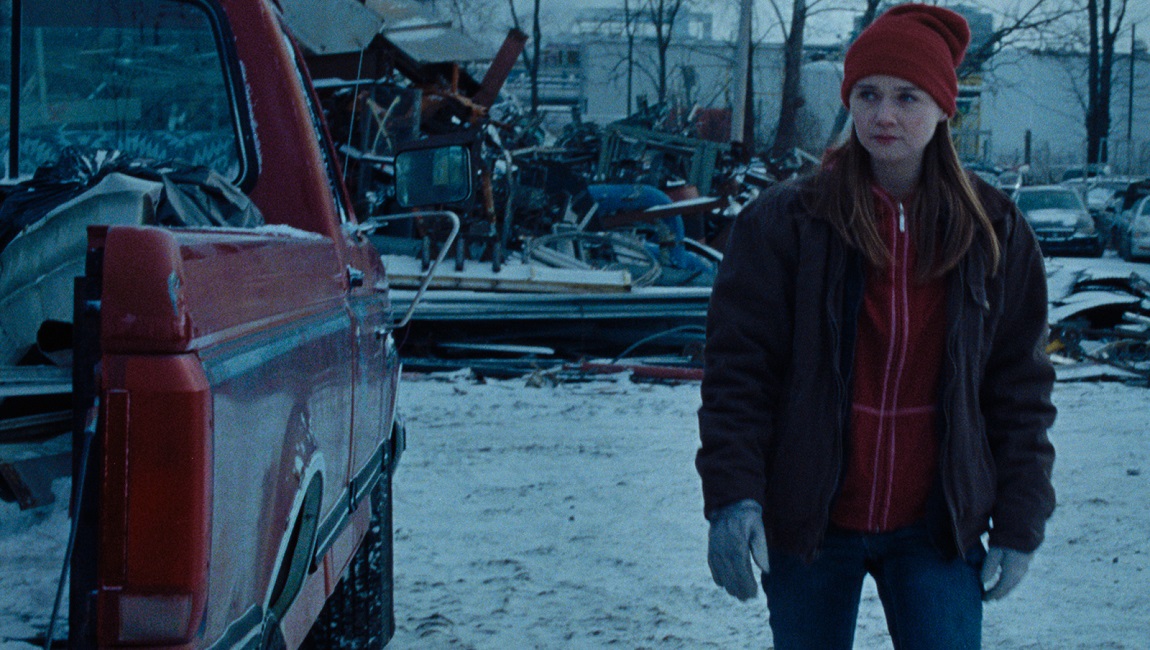Holler stumbles a bit on the way to its ending, but its strength of direction, character, and milieu make for an often thrilling bit of industrial indie cinema.
There’s a scene about halfway through Nicole Riegel’s debut feature Holler where Ruth (Jessica Barden) and her older brother Blaze (Gus Halper) are visiting their mother Rhonda (Pamela Adlon) in jail. Ruth is angry about something, everything, fed up with her mother, and gets up to leave. Riegel’s camera follows her down a corridor; Ruth pauses and the camera lingers, framing her in the foreground while Blaze and their mother remain in the background. Blaze is breaking down from the stress of being the legal guardian to his little sister, and lays his head down on the table, deflated and defeated. Rhonda tentatively raises a hand to comfort her son, before pausing and then putting her hand back down, her eyes darting nervously to and fro, like she’s somehow forgotten how to be tender (or never knew in the first place). It’s a remarkable scene, one which manages to convey a bevy of information about this particular family with only a few simple, universal gestures.
Like an Americanized Rosetta, Holler opens with Ruth running full tilt, struggling with oversized garbage bags as she barely makes it into a waiting truck, a shouting man chasing after. The siblings make money stealing cans out of dumpsters and selling them to a local scrap yard owned by Hark (Austin Amelio). Blaze and Ruth are barely scraping by in small-town Ohio, a chunk of the so-called Rust Belt which has been gutted by factory closures and the opioid crisis. Riegel quickly and succinctly zeros in on the specificity of a post-NAFTA industrial landscape — fast food chains litter the highway, interspersed with empty lots and decaying buildings. Hark deals with brokers from large Chinese firms that buy scrap in bulk, particularly brass and copper, while the local frozen foods factory that Blaze is trying to get hired on at first downsizes, then lays off its entire workforce. The only explanation workers are given is that the company “has been sold,” a meaningless distinction to the now suddenly unemployed. Riegel doesn’t overplay her hand, illustrating hardships while still emphasizing a strong sense of familial and community connections. Blaze and Ruth live in a modest home, and even though the water has been turned off, it’s hardly a hovel. People still laugh and drink and fuck. This isn’t poverty porn, a look-at-the-poor-people freak show that right-wing hucksters like J.D. Vance are selling to white NIMBY liberals. Still, there are greater institutional forces at work here as well; there’s a quietly gutting scene where a school guidance counselor tells Ruth that she shouldn’t bother with college, because of the risk of debt (the unspoken implication being that she’s not smart enough to make a go of it anyway). Earlier in the film, Ruth steals a book from the school library because she’s not allowed to check them out anymore after failing to pay past-due fines. It’s an endless cycle, but Ruth can’t seem to decide whether it’s even worth trying to break free of it.
There’s hardly a surfeit of sensitively-rendered dramas these days that realistically depict the plight of working- and middle-class families in contemporary America, so while Holler is a welcome addition to the current cinematic landscape, it’s a shame that Riegel feels compelled to sprinkle in manufactured conflict in an effort to shape the film. One can easily imagine a version of Holler content to simply spend time with these characters, amassing behavioral and environmental detail. Eventually, Ruth and Blaze get caught stealing cans from Hark and trying to sell them back to him. Sensing that they might be amenable to a job that’s not exactly legal, Hark brings them on to his crew, sneaking into buildings at night and stripping them of wires and metals. It’s a good time at first, as Hark shows them the ropes and impresses with his business acumen. As he puts it, he’s living the American dream, owns a home and a business, and didn’t even have to go to college. Of course, that dream is built on the backbone of illegal jobs, and even the Chinese market for scrap metal and recycled goods got closed off somewhere between the time that Holler was filmed and its current release. Once one of these nightly raids goes wrong, the whole thing quickly unravels, and Holler briefly becomes a thriller of sorts, giving the narrative some momentum in the home stretch but losing the specificities of place and character that work so well. Still, on the strength of Riegel’s direction, shooting in 35mm with cinematographer Dustin Lane, and pitch-perfect performances from the entire cast (it’ll be a crime if Barden gets ignored come awards season), Holler works more often than not. Being two-thirds of a masterwork is still better than what most current mainstream filmmaking can muster.







